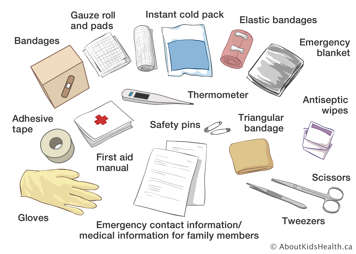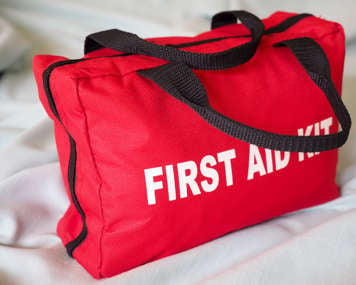Like smoke detectors and fire extinguishers, a first aid kit is a necessity for every home, cottage, and workplace. Accidents and injuries can happen to anyone at any time, so it is important to be prepared.
After you purchase or assemble a first aid kit, store it in a central location so it is easily accessible. If your first aid kit contains medications, be sure to check expiration dates and replace as necessary. Also, consider keeping a second first aid kit in your car because emergencies can happen on the road, too.

A basic first aid kit should include:
- alcohol pads or antiseptic pads
- Band-Aids (all sizes)
- cotton balls and Q-tips
- elastic bandages
- adhesive bandages
- hot and cold packs
- medical tape
- small container of sterile water or saline spray
- soap and hand sanitizer
- disposable non-latex gloves (vinyl or plastic)
- sterile gauze roll and pads in various sizes
- triangular bandages to make an arm sling
- CPR mask with one-way valve
- medical masks or face shield
Over-the-counter medications
- acetaminophen
- aloe vera gel
- antibiotic ointment
- hydrocortisone cream (1%)
- ibuprofen
- sunscreen (SPF of 30 or higher)
Other supplies
- emergency blanket (stored nearby)
- flashlight and extra batteries
- insect repellent (10% or less DEET)
- matches and candles
- paper and pencil
- safety pins
- sharp scissors
- splinting material
- thermometer
- tweezers
- bottle of drinking water
- basic pocket guide or first aid manual
- other items specific to the activity or destination
- duct tape
Additional information
Extreme temperature differences may reduce the effectiveness of some medications. If possible, try to keep the contents of the first aid kit at room temperature.
Keep a list of emergency contacts in the first aid kit. This includes the number for your local poison centre, 911 (emergency services), your health-care providers and 811 (Health811).
